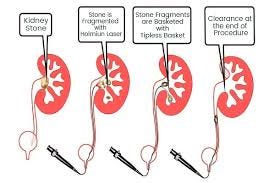Retrograde Intrarenal Surgery (RIRS) is an advanced, minimally invasive procedure for treating kidney stones and other renal issues. Jaipur has become a hub for modern healthcare, with hospitals and clinics equipped to perform RIRS, catering to patients seeking effective, precise, and less invasive solutions for kidney stones.

Understanding RIRS
RIRS is a surgical procedure in which a flexible ureteroscope is inserted through the urethra, bladder, and ureter, allowing doctors to reach the kidney’s inner structures without making incisions. Once the kidney stone is located, it is broken into smaller pieces using a laser. These fragments can either be removed with a basket-like tool or left to pass naturally through the urine. RIRS is especially effective for treating kidney stones in difficult-to-reach areas, which traditional surgical methods may not access without significant tissue disruption.
The Procedure
The RIRS procedure begins with administering anesthesia to ensure patient comfort and a pain-free experience. A flexible ureteroscope is then gently passed through the urinary tract to reach the kidney. The surgeon uses a high-definition camera attached to the ureteroscope to visualize the stone and target it with a Holmium laser, known for its high efficacy in fragmenting stones. The entire process takes between 30 minutes to an hour, depending on the size and location of the stones.
Benefits of RIRS Surgery
- Minimally Invasive: RIRS is performed without incisions, reducing the risks associated with open or laparoscopic surgeries. The procedure is relatively gentle on surrounding tissues, which helps in faster healing.
- Quick Recovery: Since RIRS doesn’t involve major cuts, recovery is rapid. Patients can often resume normal activities within a few days, making it ideal for those with busy lifestyles.
- Precision: The flexible ureteroscope and high-definition imaging allow the surgeon to locate and target even the smallest stones precisely, reducing the chances of residual stones or recurrence.
- Lower Risk of Complications: RIRS reduces the risk of complications, such as infections or excessive bleeding, which can occur with open surgery.
- Suitable for Various Stone Sizes and Locations: RIRS can treat kidney stones located in hard-to-access areas. It is effective for small to medium stones and can be used for patients who cannot undergo other types of kidney stone surgeries.
RIRS Surgery in Jaipur: Facilities and Expertise
Jaipur is home to several advanced medical facilities where RIRS surgery is performed with state-of-the-art equipment. Many urologists in Jaipur specialize in minimally invasive procedures and have extensive experience handling complex kidney stone cases. These centers are equipped with the latest Holmium laser technology and high-definition flexible ureteroscopes, which ensure safe, effective, and accurate treatment.
Choosing the Right Surgeon for RIRS in Jaipur
Selecting an experienced urologist is essential for a successful RIRS procedure. Look for a surgeon with expertise in kidney stone management and a strong background in minimally invasive techniques. Jaipur has renowned urologists with advanced training in RIRS who are highly regarded for their skill and patient-centered approach. Some of the top urologists in Jaipur are associated with hospitals that emphasize quality care, patient safety, and quick recovery.
Cost and Insurance
The cost of RIRS surgery in Jaipur is relatively affordable compared to other metropolitan cities in India. Many hospitals in Jaipur also offer cashless facilities and accept insurance, making it easier for patients to receive timely treatment.
Conclusion
RIRS surgery in Jaipur represents a breakthrough in kidney stone treatment, providing patients with a less invasive, highly effective option. With experienced urologists, advanced technology, and comprehensive patient care, Jaipur has become a trusted destination for those seeking RIRS surgery.





.jpg)
Comments